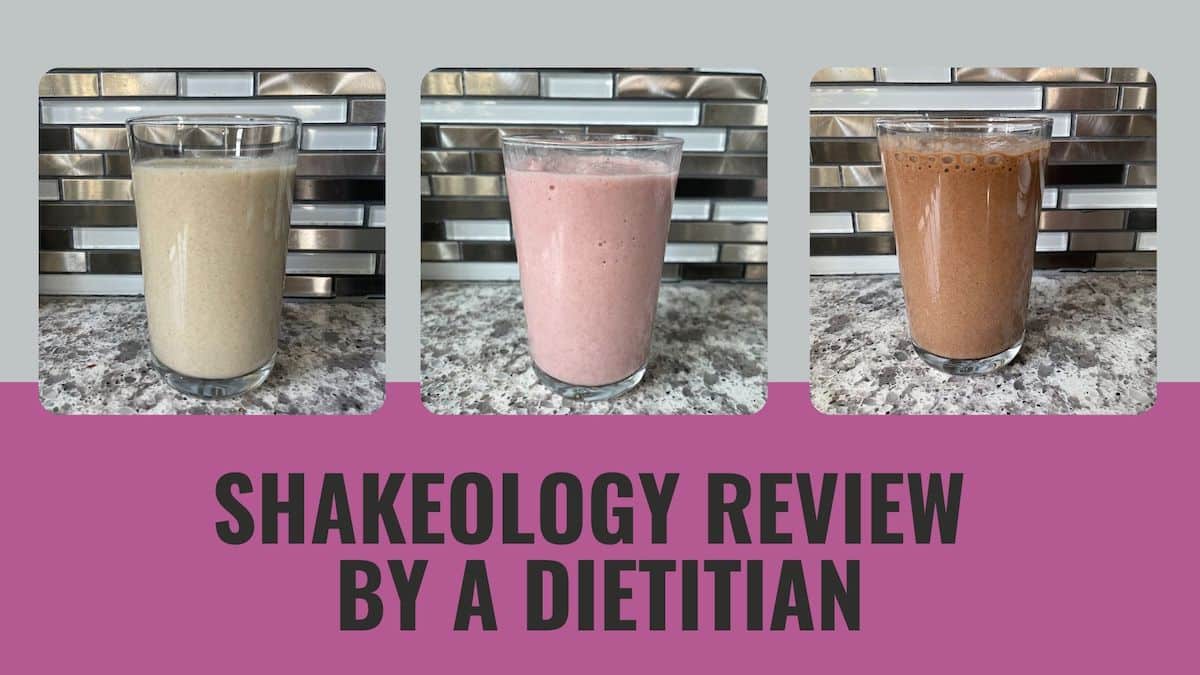
Is Beachbody’s Shakeology worth the money? A Non-biased Dietitian’s Review
A Dietitian shares an unbiased Shakeology review including the pros, cons and alternatives to this popular Beachbody shake.
You might be struggling with energy levels, weight loss or digestive issues. And along comes your fitness-giant Beachbody, promoting their popular protein shake mix, Shakeology. Or a “superfood nutrition shake” as they call it.
Shakeology claims to be: “A world of superfoods in every glass.” But do the claims stand up – can it help with weight loss, energy, digestive issues and more?! And is it worth the money?
This blog post will review Shakeology, including the ingredients in Shakeology, the pros and cons, my own taste test, and some cheaper alternatives to Shakeology.
Let’s get going!
Shakeology Ingredients
Here’s a link to the full ingredients in the whey-based Chocolate flavour, including the amounts of ingredients.
The instruction/marketing booklet that came along with my order states Shakeology contains the following:
- 4 supergreen and phytonutrient sources
- 3 superfruit sources
- 5 antioxidant sources
- 8 adaptogen sources
- 4 prebiotic/probiotic sources
- 6 digestive enzymes
- 4 protein sources (whey protein, flax, quinoa, and pea protein)
- 4 fibre sources
Highlighted ingredients include maitake, moringa, maca root & ashwagandha.
Since some ingredients read Greek to most of us, I’ll break down a few of them here. What they are, how much Shakeology contains and some ingredient claims or potential uses.
I use the Natural Medicines Database as my main reference.
Chorella (600mg)
Chlorella is seaweed, which is an antioxidant and perhaps antiviral. It’s probably effective for pregnancy-related iron deficiency. For other claims, there is not enough evidence (as is a common story for many of the ingredients…).
Natural medicine says studies have safely used 300-1800mg of Chlorella, so 600mg sounds like a reasonable serving size.
Yacon Root (400mg)
Yacon is a prebiotic. Prebiotics feed probiotics or the healthy bacteria in our gut. Yacon is slightly sweet in flavour and often used as a natural sweetener. But it is listed as fibre on the nutrition facts table.
The type of prebiotic in Yacon root is called fructooligosaccharides. Supplements of Yacon contain about 400-2000mg. So again, while 400mg is on the low end, it’s not just a slight dusting to allow addition it the ingredient list. It seems like an appropriate amount.
Chicory + Inulin (250mg)
Inulin is also a prebiotic. The chicory root also contains 75mg of inulin so a total of 325mg inulin per serving. Prebiotics can help create a healthy gut and also serve to sweeten food products naturally.
But prebiotics can cause intestinal pain like gas, bloating and diarrhea in some people, especially if you have irritable bowel syndrome.
Astragalus (250mg)
This root has been traditionally used as an “adaptogen.” Adaptogens may help the body resist physical and mental stress. Up to 60g (60,000mg) per day for four months is safe, according to Natural Medicine Database.
Astragalus has dozens of health claims, from diabetes to menopause symptoms. All of the claims have insufficient evidence. This doesn’t necessarily mean that they’re not true, just that more research is required to prove it.
MSM (150mg)
Methylsulfonylmethane (MSM) is a naturally occurring compound in some green plants, algae, fruits, vegetables, grains and milk. Normally it’s well tolerated but can cause bloating, diarrhea and nausea.
MSM is possibly effective for helping osteoarthritis. There are many claims of health conditions MSM may help with but have not been proven, from ageing and athletic performance to Alzheimer’s….and those are just the conditions that start with the letter “A.”
Camu Camu (200mg)
Camu is an evergreen shrub from the Amazon rain forests. While again, there’s not enough evidence, Camu Camu is an antioxidant and is said to help asthma, atherosclerosis, cataracts, cold sores, colds, chronic fatigue syndrome, gingivitis, glaucoma, headache and more.
Digestive Enzymes (ex Alpha-amylase, Lactase)
If you have pancreatic insufficiency, you’d be on a prescription for digestive enzymes from your doctor. While certain digestive enzymes can be more widely used (like lactase to help digest lactose if you’re intolerant), you likely don’t need this.
L-methyltetrahydrofolate (200mg)
Shakeology contains vitamins and minerals such as calcium, zinc, magnesium and L-methyltetrahydrofolate. Folate is a B vitamin. Depending on a certain gene, many people can’t properly use folic acid, the normal supplemental form.
I can tell the Shakeology developers have put a lot of thought into the ingredients. It’s not always common to see B vitamins in their more absorbable forms.
Bacillus coagulans (250 million CFU)
An effective probiotic supplement should contain at least 10 billion CFUs. Health Canada requires probiotic-containing food to have at least 1 billion before they can claim “promoted healthy gut flora.” So while probiotics can be useful in creating a healthy gut, there’s not enough in Shakeology to make a difference.
Sweeteners
Shakeology contains stevia, evaporated cane juice (this is just sugar), pomegranate juice concentrate, goji berry juice concentrate, bilberry fruit juice concentrate and prebiotics as sweeteners.
While fruit concentrates may sound like part of the “superfood” ingredients, they must be classified as added sugar on food labels. And likely have little, if any, nutritional benefit beyond as a sweetener.
Shakeology nutrition facts review
Nutrition Facts for the Chocolate shake are listed here.
When mixed just with water (blech), one serving contains:
160 calories 17 carbs 6g fibre 7g sugar 17g protein The fibre amount is decent. Although not all of it is whole grain fibre, but prebiotic fibre (inulin or chicory root). Adding prebiotics bumps the fibre levels but doesn’t have the benefits that come with whole-grain fibre, like lowering cholesterol and improving poops.
The sugar level isn’t crazy high. Some is needed to be added to cover the more bitter herbs and flavours. On top of the Stevia. So that you have a better idea, 8 grams of sugar is 2 cubes of sugar, so 7 grams of sugar is close to that.
At 17 grams of protein, this seems pretty standard for a protein-type shake (around 20g). We need at least 0.8g per kg protein per day, so 54g per day for a person weighing 150 lbs/68kg. A 100g chicken breast contains about 30g, and a glass of milk 9g, as reference.
Is there any research on Shakeology?
Most of the claims for Shakeology like:
- Feel better
- Support healthy energy levels
- and benefit overall health, are not referenced.
Their claims about weight loss, decreased appetite, and food cravings led to one clinical trial published in the journal Current Developments in Nutrition. It was published online when I first wrote this blog, but seems to have disappeared now. The study included 41 adults who drank Shakeology, or a calorie-matched (but low fibre and protein) shake 30 mins before a meal of unlimited pizza.
When looking at the study’s results, the first line sums it up for me “Looking at the ad libitum energy intake (aka calories from the pizza) in the unadjusted model showed no significant differences.”
However, the Beachbody website states differently: “those who consumed the Shakeology found the desire to eat was reduced by 58% and helped them eat 180 fewer calories at next meal.” What is the difference between some of the study results and Beachbody’s interpretation? Marketing.
Regardless, I don’t give out diets and wouldn’t recommend someone consume Shakeology before a meal (or as a meal replacement shake) to support weight loss.
Potential Shakeology Side Effects
From the back of the Shakeology package:
Contra-indications:
Do not use it if you:
- have any chronic health conditions or take other medication without consulting a health care practitioner. “
- are pregnant or breastfeeding.” (I have a post on safe shakes when breastfeeding here).
- are taking health products that affect blood coagulation (e.g. blood thinners, clotting factor replacements, acetylsalicylic acid, ibuprofen, fish oils, vitamin E as this may increase the risk of spontaneous bleeding.”
Cautions and Warnings:
“Discontinue use and consult a health care practitioner if symptoms of digestive upset (e.g. diarrhea, nausea, vomiting) occur, worsen, or persist beyond 3 days.”
Known Adverse Reactions
“Hypersensitivity/allergy, headaches, heartburn and bloating have been known to occur, in which case, discontinue use. Some people may experience gastrointestinal bloating, constipation or indigestion.”
And when googling “Shakeology side effects,” the top searches that pop up include: “Shakeology makes me fart.” “Shakeology makes me sick.”
I didn’t experience this when I sampled Shakeology; I imagine most people don’t. Or it wouldn’t still be for sale.
Yet I did find a site (likely selling Shakeology) that claimed: “Most of the side effects due to Shakeology are due to a poor diet and Shakeology having too many healthy ingredients, which results in your body going into a bit of shock.” Riiiiight. Total BS. You’re not “Detoxing.” You’re likely farting due to an intolerance to one+ of dozens of ingredients like chicory and inulin (especially if you have Irritable Bowel Syndrome).
Cons of Shakeology
Other than the potential side effects listed above….
Expense:
How much does Shakeology cost? Four samples cost $23.95 CAD, plus $10 shipping, for a total of $35.10. This is $8.75 per serving, which could provide a lot of food! But I imagine most people don’t just buy the odd sample.
If you want a full bag (30 servings), you can get it for $155 CAD plus Shipping and handling, which is just over $5 per serving. At least now, you buy one bag at a time. It used to come on auto-ship until Beachbody was sued for $3.5 million for auto-charging credit cards without the client’s written consent.
Multi-level Marketing (MLM) sales:
MLM for fitness and nutrition products turns consultants into automatic fitness/nutrition ‘experts.’ This could be dangerous. My Beachbody consultant friend is lovely and not pushy at all.
But I’m sure you’ve had negative experiences with the opposite (World Financial Group….RUN!!).
Beachbody & weight loss focus:
While Beachbody primarily sells workouts, it upsells to purchase Shakeology for additional effects. Which definitely doesn’t replace the rest of your day-to-day food choices.
And Shakeology will not give you an automatic “Beach Body.” The Shaekology claims for weight loss are followed by small print: “Results vary depending on starting point and effort. Exercise and a healthy diet are necessary to achieve and maintain weight loss and muscle definition. The testimonials featured may have used more than one Beachbody product or extended the program to achieve their maximum result.”
For reviews of some of Beachbody’s other programs, check out fellow dietitian Abby Langer’s article.
Pros and Cons of Shakeology: A review
So, while everyone is different – you may experience increased energy, decreased digestive issues or weight loss on Shakeology. And others may experience gas and bloating!
Ultimately, Shakeology is a nutrient-dense nutritional shake. And the levels of many of the ingredients seem to be substantial with potential health benefits.
But it’s easy and cheaper to make a shake at home and add your own protein options. So that’s what I would ultimately recommend. If you’re looking for an alternative, check out my post here on shakes for postpartum (but good for everyone!)
Jennifer House is a Registered Dietitian, author & mom of 3. From Baby-led weaning to picky eating and meal planning, she helps you to make feeding your family easier.
Founder of First Step Nutrition | Registered Dietitian Nutritionist
Jen believes raising happy, well-nourished eaters who have a healthy relationship with food doesn't have to be a battle! She is an author and speaker with 18 years of experience specializing in family nutrition and helps parents teach their kids to try new foods without yelling, tricking, or bribing.






Charley
Posted at 08:43h, 26 MarchWhat are the cheaper alternatives? I don’t see them throughout the article?
Jennifer House MSc, RD
Posted at 09:13h, 26 MarchFor adding protein to smoothies/shakes at home, you can use options like skim milk powder or pasteurized egg whites (sold in a container in the egg section of your grocery store). Hemp hearts or greek yogurt are great add-ins too. For a protein powder, almost all of them will be cheaper than Shakeology. A single-ingredient whey or collagen will do the job for cheaper. I have a few brands on this post: https://firststepnutrition.com/blog/protein-powder-while-breastfeeding/
Tara L
Posted at 14:05h, 13 AugustWhat is the issue with this shake and omega 3? I take fish oil/omega 3 daily but would like to start with a meal replacement for my morning breakfast.
AdminHouse
Posted at 15:45h, 30 AugustThe nutrition facts don’t specifically list omega-3 fats. It does contain some chia seed, so would contain some ALA omega-3 fats. But I wouldn’t consider it a major source, you might consider taking a fish oil/algae supplement if you don’t eat fish 2 times a week.
Karina Pettengill
Posted at 16:56h, 23 AprilHow would you compare Shakeology to 310 Shakes? Is the Superfood content comparable?
AdminHouse
Posted at 14:43h, 24 AprilI see some similarities! They both have some digestive enzymes and adaptogens. I prefer the Shaekology form of folic acid. But the 310 Shakes has a higher level of probiotics, which is good. Both of these shakes just have so much in them.Personally, I prefer a simpler shake with just protein (if you’re looking to increase protein). I have some other options here: https://firststepnutrition.com/blog/protein-powder-while-breastfeeding/
Leah Strydom
Posted at 08:54h, 15 JanuaryCan you tell me why Shakeology is not good for pregnancy? I just purchased some from a lady who drinks them and is pregnant herself. I assumed it was safe but after reading your article, you recommend not taking it. So just wanted to know your thoughts on why?
Thank you so much
AdminHouse
Posted at 08:52h, 16 JanuaryHappy to share! Yes, Shakeology is a nutritional supplement and contains lots of herbs. Some of which may not be safe in pregnancy, including ashwagandha and maca (which contains caffeine too). The Beachbody website recommends Shakeology “should only be taken by pregnant women and nursing mothers under the direction of their physicians”